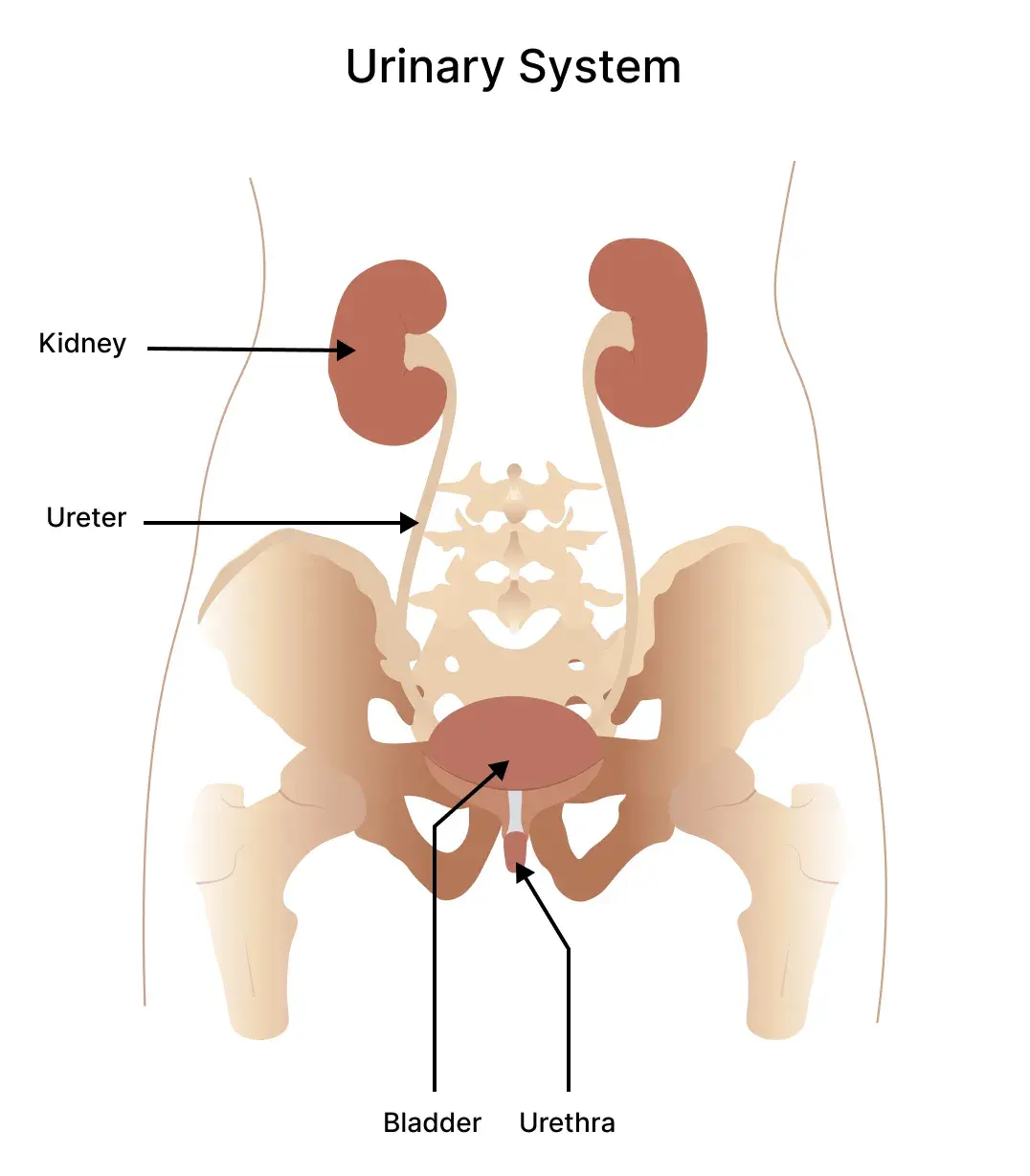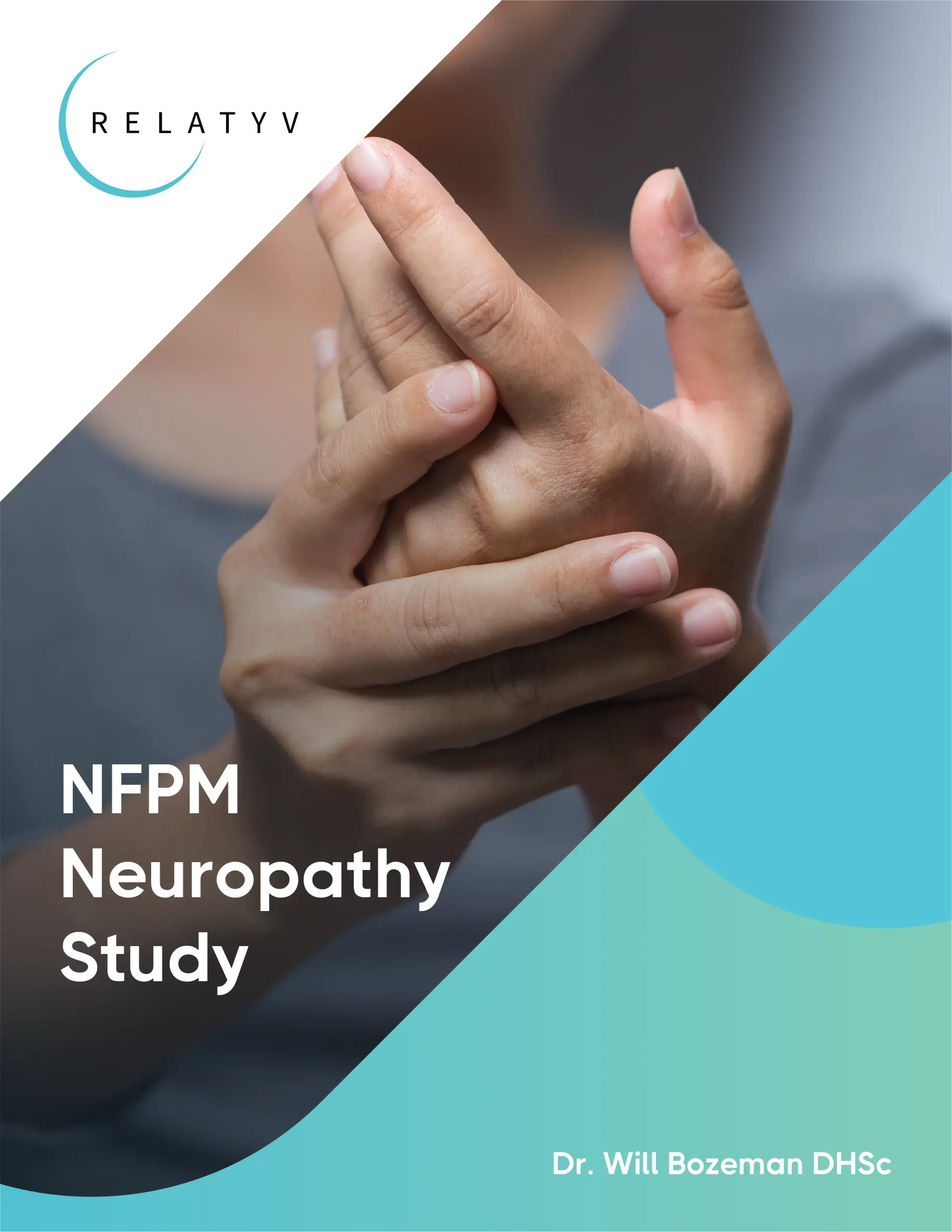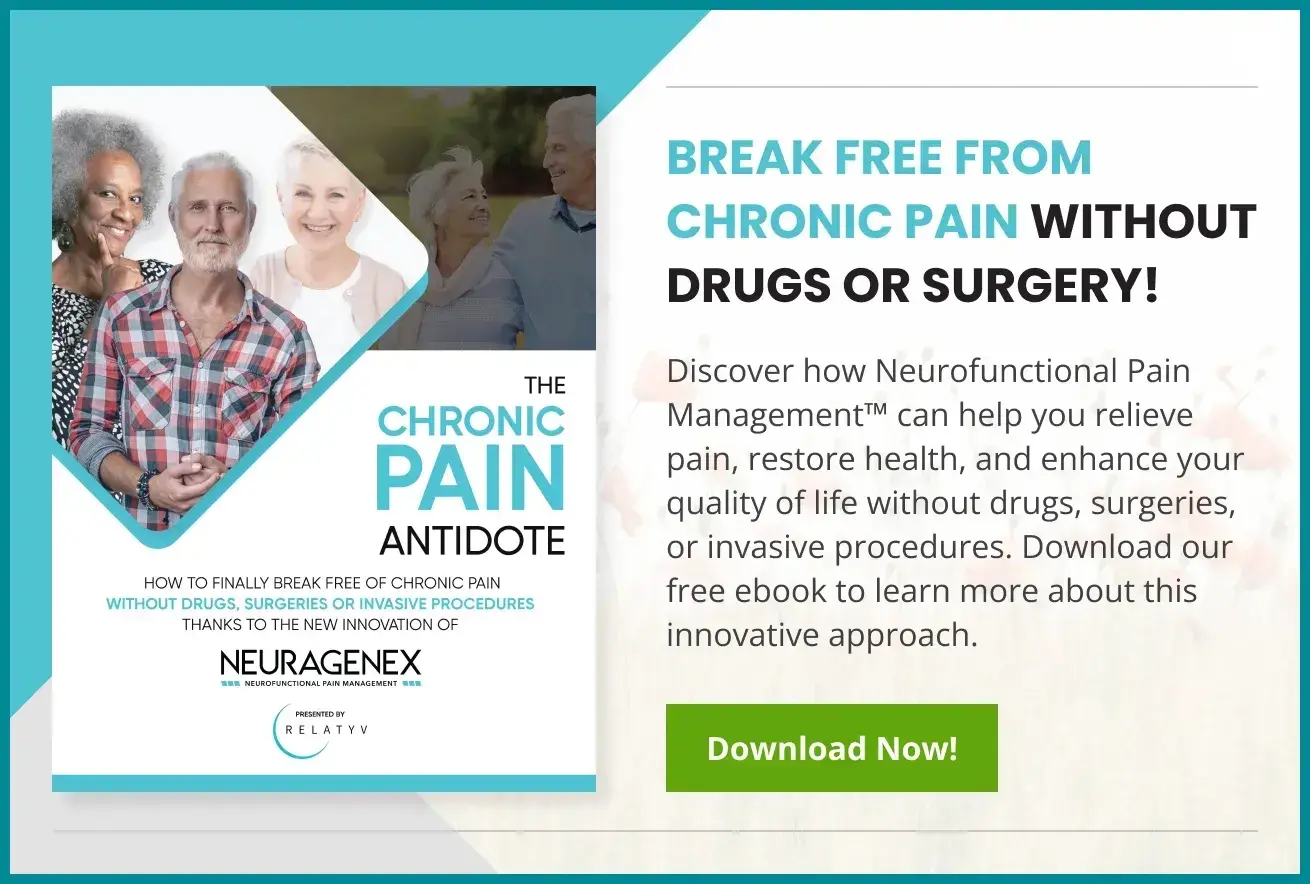Interstitial cystitis (IC) is a chronic health condition affecting the bladder, causing persistent pain and discomfort in the lower abdomen. Aside from pain, several other uncomfortable symptoms may develop throughout the urinary system, significantly disrupting various aspects of a person’s daily life. These disruptions can extend to work, an individual’s mental health, and relationships, creating a considerable impact.
In this guide, we explore the intricate nature of IC, uncovering its causes, various symptoms, how it’s typically diagnosed, and the potential impacts it can have on the lives of those diagnosed with this complex chronic pain condition. We discuss both medical and complementary treatment options typically used to address IC discomforts.
Moreover, we’ll introduce how we offer an innovative approach to providing much-needed relief from the relentless pain associated with IC without resorting to heavy medications or invasive surgeries and procedures. For healthcare providers seeking detailed information on our treatment protocols, please visit our urology provider page.
Our aim is to help you identify the source of your discomfort, make well-informed health decisions, and find the best approach for managing your IC pain that improves your quality of life so you can regain a sense of normalcy.
Let’s begin by taking a closer look at the anatomy of the bladder and exploring the pathophysiology of IC.
Exploring The Anatomy Of The Bladder
The urinary system is one of the most complex networks in your body. It comprises four main parts: the kidneys, ureters, bladder, and urethra. This network of organs plays a crucial role in maintaining your overall health by regulating various seemingly unrelated processes in the body. Let’s delve a little deeper.
This intricate system starts with the kidneys, two crucial organs responsible for filtering waste products and excess fluids from the bloodstream. Within their bean-like structure are complex filters that sift the blood to remove toxins and excess fluids. This filtered fluid becomes urine, which is delivered from the kidneys to the bladder through two slender tubes called ureters.
The bladder sits at the core of the urinary system, responsible for storing and releasing urine. Sitting in the lower abdomen region, this pear-shaped, muscular, hollow sac is connected to an extensive network of nerves. These nerves play a pivotal role by relaying messages to the brain, signaling when the bladder is full, and prompting the need for urination.
Functioning as a reservoir, the bladder gradually expands to hold approximately 400-600 milliliters of urine. When full, nerve functions prompt the bladder to contract and smoothly release urine through the urethra, exiting the body in the process of urination. After this, nerve activity decreases, allowing the bladder to relax and gear up for the next controlled cycle.

Any disruptions to this complex system, such as those seen in conditions like IC, can impact its delicate balance. In the next section, we’ll discuss what specifically affects the urinary system that causes the pain and uncomfortable symptoms associated with IC.
What Is Interstitial Cystitis (IC)?
IC is a long-term pain condition where the bladder wall becomes inflamed and irritated, causing persistent discomfort that lasts for six weeks or more without a clear cause. Also known as “painful bladder syndrome” or “frequency-urgency-dysuria syndrome,” IC affects the intricate physiology of the urinary system, particularly the bladder and urethra.
Ongoing inflammation in the bladder can cause muscle scarring, leading to stiffening of the bladder wall. Over time, this reduces its ability to expand and contract as it once could, lowering the bladder’s total urine-holding capacity.
Additionally, persistent bladder irritation significantly impacts the nerves surrounding the bladder, disrupting communication with the brain and muscles. This disruption can trigger individuals to experience a range of distressing symptoms, with pain and pressure being primary features. Let’s take a closer look at these symptoms.
Symptoms Of Interstitial Cystitis
It’s important to recognize that IC is not a one-size-fits-all condition. Symptoms can differ between individuals and might range from occasional flare-ups to a persistent challenge. Common struggles for those with IC involve:
Pain And Discomfort
IC is known to cause persistent pain and discomfort. This can present as a constant ache, increased pressure, or a stabbing sensation in the pelvic area, lower abdomen, or perineum (area between the anus and the scrotum or vulva).
The degree of pain can also vary, ranging from mild discomfort to severe, debilitating sensations. It often worsens as the bladder becomes fuller, only easing after the bladder is emptied.
Urinary Urgency and Frequency
Individuals with IC frequently experience a heightened sense of urinary urgency and frequency. This means they have the feeling of needing to urinate more often than usual, even if the volume of urine produced is small.
Urgency and frequency happen because the bladder’s irritated nerves send inappropriate signals to the brain that it’s time to urinate, even when the bladder isn’t full. Alternatively, it can happen because the bladder can’t stretch as much as it should, causing it to feel full and needing to be emptied more frequently.
Urinary Incontinence
In severe cases, IC may lead to urinary incontinence. This is where individuals find it challenging to control their bladder function, resulting in involuntary urine leakage. This debilitating symptom is more prevalent in older adults with IC or during times of urgency or physical exertion.
Urinary incontinence adds another layer of complexity to the daily lives of those dealing with IC, demanding constant awareness and management.
Intimacy Problems
The challenges associated with interstitial cystitis may extend to intimate aspects of life. Pain and discomfort can make sexual activity difficult and, in some cases, extremely painful.
This symptom is believed to stem from spasms in the pelvic floor muscles, which support the bladder, bowel, and either the uterus or prostate. The fear of exacerbating symptoms during sex may contribute to anxiety and strain relationships.
Recognizing and understanding the symptoms of this chronic bladder condition is the first step in navigating its ongoing challenges. Later on in this guide, we’ll discuss how the persistent discomfort and debilitating symptoms associated with IC can significantly impact a person’s quality of life
But next, we’ll delve deeper into the causes of IC, highlighting some of the factors linked to this condition.
Endometriosis Pain With Intercourse
Dealing with pain during intercourse can be a source of significant distress and discomfort for both partners. In addition to the obvious physical pain, there is often an emotional toll that can be taken when dealing with sexual...
Excess Gas In The Stomach
Are you experiencing stomach bloating or excess gas? Discover the causes, symptoms, and effective remedies to manage gas pain with Neuragenex...
Muscle Spasm In The Stomach
Experiencing a muscle cramp can be painful and uncomfortable. While cramps can occur in any area of the body, muscle spasms in the stomach are particularly common. In fact, almost everybody will experience muscle spasms of some kind throughout their lifetime....
Muscle Spasm Pelvic Floor
The pelvic floor is a group of muscles and tissues located at the bottom of the pelvis. These muscles support your bladder, bowel, and reproductive organs. They play a crucial role in maintaining urinary and fecal continence, sexual function, and overall...
Painful Periods
Painful periods – a condition known as dysmenorrhea – are certainly not normal, and they can be a symptom of a more serious underlying condition. With an accurate diagnosis provided by our specialists and a tailored Neuragenex Neurofunctional Pain...
What Causes Interstitial Cystitis?
Experts are still researching to discover the exact cause of IC. However, some theories suggest complex interactions between the immune system, nerves, and the bladder lining. Let’s explore some of these potential triggers in the headings below:
Bladder Inflammation
Inflammation is a key aspect of the pathophysiology of interstitial cystitis. However, it doesn’t necessarily result from bacterial infection, like a urinary tract infection (UTI) would.
Instead, it’s suspected that IC inflammation may be due to damage or dysfunction of the protective mucosal lining of the bladder. This then leads to urine or any other harmful components coming into contact with the delicate lining of the bladder and causing inflammation. Inflammation brings further irritation, pain, and increased sensitivity to the bladder and pelvic region.
Pelvic Floor Dysfunction
Pelvic floor dysfunction is identified as another potential cause of or co-existence with interstitial cystitis. The pelvic floor is made of many strong muscles, ligaments, and connective tissues that support the bladder, rectum, and reproductive organs.
Dysfunction of the pelvic floor network, whether excessively tight or too weak, can cause pelvic pain, urinary urgency, and altered bladder function. Addressing pelvic floor issues through physical therapy and targeted exercises is a common approach to managing interstitial cystitis symptoms.
Autoimmune Disorders
There has been a strongly identified relationship between a number of autoimmune disorders and interstitial cystitis, suggesting a potential immune system involvement in the development of the condition. Autoimmune conditions such as fibromyalgia, irritable bowel syndrome (IBS), and chronic fatigue, among others, have all been associated with an increased risk of interstitial cystitis.
In autoimmune-related IC, the immune system may mistakenly target the bladder’s special smooth muscle receptors, leading to inflammation and damage. Understanding these connections can guide healthcare professionals in tailoring treatment approaches for individuals with autoimmune-related IC.
Nerve Damage
Damage to the bladder’s intricate nerves is another potential contributor to interstitial cystitis, affecting communication between the bladder, spinal cord, and brain. When these nerves sustain damage or dysfunction, it can lead to abnormal sensations, heightened pain perception, and disruptions in bladder control.
Nerve damage may have physical causes, such as a spinal cord injury, surgical complications, or trauma. However, in rare cases, nerve dysfunction in the bladder region may be associated with medical conditions like diabetes, Parkinson’s disease, or multiple sclerosis (MS).
Ultimately, IC is a multifaceted condition with various and possibly interconnected causes. Identifying these potential factors is crucial for early detection and finding personalized management strategies. Now, let’s explore the daily challenges faced by individuals with IC.
How Interstitial Cystitis Affects Daily Life
Dealing with IC brings significant challenges due to its intense symptoms, difficulty in diagnosis, unclear causes, and persistent nature. These factors understandably affect a person’s overall well-being, bringing both physical and psychological challenges. Daily challenges for those with IC can include:
Physical Limitations
Physical limitations are sometimes the most significant everyday challenges for people struggling with IC. Chronic pain, ongoing pressure, and urinary symptoms can disrupt daily routines and make even simple tasks uncomfortable.
Additionally, IC symptoms may result in reduced mobility, making regular exercise difficult, as well as making participation in social events complicated. Navigating daily life with IC involves understanding and managing these physical limitations.
Emotional And Mental Health
The emotional and mental toll of interstitial cystitis is profound. Dealing with persistent pain, unpredictable symptoms, and the potential for social isolation can contribute to heightened levels of stress, anxiety, and even depression.
The emotional impact is not confined to the individual with IC alone but may also extend to their support network. Relationships, social interactions, and overall involvement in a meaningful life may be affected. Being aware of and addressing the psychological impact of IC is essential for maintaining good emotional and mental health.
Work And Productivity
The physical and psychological impacts of IC can make it tough to stick to regular work routines and stay productive. The need for frequent bathroom breaks, the possibility of pain flaring up, and the mental stress of handling symptoms during work hours can greatly impact a person’s professional life based on how well symptoms are managed. Individuals may need to seek career support to find the right balance for both their work and health needs.
Understanding the broad impact on physical, emotional, and occupational well-being is crucial for individuals with IC, along with their close network of family, friends, and healthcare providers.
By addressing all dimensions affected by IC, individuals have a better chance of navigating its challenges and improving their health outcomes.
Seeking early support from healthcare professionals and exploring various management strategies can contribute to improved quality of life for those living with IC. We’ll explore the clinical processes of diagnosing IC in the following section.
Diagnosing Interstitial Cystitis
Diagnosing IC involves a thorough approach that aims to understand the interaction of symptoms while ruling out other possible causes. Because there is no definitive test for IC, healthcare professionals use a combination of medical history assessment, physical examinations, and specialized tests to arrive at a comprehensive diagnosis. Here’s what you can expect from the diagnostic process when investigating IC.
- Medical history: Your doctor will begin with an in-depth exploration of your medical history and current symptoms. They’ll ask about their onset, duration, characteristics, and potential triggers or exacerbating factors. Valuable information includes the nature of pain, altered urinary patterns, and any associated concerns you may have.
- Physical examination: A thorough physical examination is conducted to assess the pelvic region, which includes the abdomen, pelvic floor muscles, and genitals. You can expect the doctor to touch your belly and feel your abdomen for signs of swelling, stiffness, and areas of tenderness.
- Specialized tests: Several tests are used to rule out urinary tract infections and assess components of the urinary system. These include testing urine samples and blood samples. Beyond lab tests, urodynamic studies can evaluate your bladder function and identify abnormalities in its volume capacity and elasticity.
Additionally, a cystoscopy may be recommended. In this procedure, a small camera inserted through the urethra provides direct visualization of the bladder’s interior, helping detect the presence of inflammation or other abnormalities.
- Imaging: In certain cases, imaging studies such as ultrasound or magnetic resonance imaging (MRI) may be recommended to rule out other potential causes of symptoms and provide a more detailed view of the bladder and pelvic region. While imaging alone cannot confirm IC, it offers valuable insights for doctors in ruling out other potential causes.
Oftentimes, diagnosing IC involves collaborative teamwork among your primary care physician, nurses, and specialists. Open communication with your healthcare team is crucial if you have any concerns regarding your symptoms. It helps them reach a quick and accurate diagnosis, allowing you to begin treatment strategies that enhance your quality of life.
Conventional treatments can involve a number of different medications, which we’ll discuss more in the following section.
Medications Available For Relief
IC, with its intricate nature and individual symptoms, brings about some unique challenges in terms of treatment. While a range of medications is available to reduce symptom discomfort, it’s crucial to understand that IC management often involves a personalized approach, as responses to medications can vary among individuals.
Tricyclic Antidepressants
Tricyclic antidepressants (TCAs) can be beneficial for the pain and pressure sensations of IC. Beyond their primary role in treating depression, TCAs, such as amitriptyline, can positively impact the urinary tract.
These medications may help by relaxing the bladder and modulating pain signals, providing relief to individuals grappling with the persistent discomfort associated with IC. It’s important to note that the use of TCAs for IC is different from its use in depression, with different dosages and effects.
Antihistamines
While antihistamines are commonly known for dealing with allergies, medications like hydroxyzine can also assist in easing specific interstitial cystitis symptoms like frequency and pain.
The idea behind using them is that they block histamine receptors, which helps reduce inflammation in the bladder lining. Various antihistamines, such as Claritin and Benadryl, might be useful for you. It’s about figuring out which one suits you best.
Pain Relievers
For managing IC symptoms, using pain relievers is another choice. Your doctor might suggest nonsteroidal anti-inflammatory drugs (NSAIDs) or acetaminophen to help with pain and discomfort. For more severe cases, long-acting narcotic or opioid analgesics may be prescribed.
But when it comes to chronic conditions like IC, it’s crucial to be cautious about pain relief methods. Consider how your body responds and be aware of potential side effects from long-term use.
Having a conversation with your healthcare provider about prescription medications is crucial. It ensures you’re well informed about the treatment plan and understands the risks and benefits of long-term medication use. This discussion helps align your needs and responses with health goals, ultimately enhancing your quality of life.
In addition to medications, some individuals find complementary remedies provide additional benefits for their IC symptoms. Let’s explore these alternatives next.
Complementary Treatments For Interstitial Cystitis
Bladder Training
Bladder training is a useful method to help individuals regain control over their urinary patterns. It involves a structured technique of bathroom breaks, gradually extending the time between visits.
For those with IC, bladder training focuses on improving bladder capacity and reducing the urgency and frequency of urination. The goal is to establish a more predictable bathroom routine and restore a sense of control over symptoms.
Trigger Point Therapy
Trigger point therapy is a targeted intervention that addresses specific areas of muscle tension associated with IC symptoms. By identifying and releasing trigger points, particularly within the pelvic floor, this therapy aims to alleviate pain and discomfort.
In the context of IC, where pelvic floor dysfunction can contribute to symptoms, trigger point therapy becomes a valuable tool. It seeks to restore muscular balance, offering relief from the intricate web of symptoms woven into the IC experience.
Bladder Instillation
Bladder instillation, also known as a bladder wash or bath, is a treatment for introducing therapeutic substances into the bladder. A solution with medications like dimethyl sulfoxide (DMSO) or heparin is introduced into the bladder through a catheter. The goal of bladder instillation is to calm the irritated bladder lining and ease symptoms.
These complementary treatments aim to offer more targeted therapeutic approaches to manage IC in addition to medications. However, just like many chronic health conditions, some people may struggle to find options that provide sufficient long-term relief.
In the next section, we’ll explore an innovative therapy and how it brings hope to individuals seeking lasting relief from the pain and inflammation caused by IC.
Is There A Better Way To Deal With The Pain Induced By IC?
For individuals facing the persistent pain and debilitating symptoms of IC, finding lasting relief is a top priority. We offer an alternative and innovative approach to managing interstitial cystitis pain through a specialized Neurofunctional Pain Management (NFPM) protocol.
This unique method focuses on stimulating the nervous system to reduce inappropriate pain signals, thereby relieving nerve pain at a cellular level and providing a path to long-lasting relief. It also targets harmful inflammatory processes in the body and aims to improve overall comfort and quality of life.
Our customized protocol takes a whole-person approach, addressing IC without the need for drugs, chiropractic adjustments, or invasive procedures. Instead, our approach includes the following therapies:
Electroanalgesia
Electroanalgesia is a pain management technique that uses high-pulse electrical current to ease pain, boost blood circulation, improve mobility, and induce...
IV Therapy
IV nutritional therapy, or intravenous therapy, involves administering vital nutrients directly to the bloodstream through an IV. This type of treatment bypasses the digestive system, allowing for maximum absorption and utilization of nutrients by the...
Lifestyle Counseling
Lifestyle counseling is an approach to managing chronic pain that involves identifying, assessing, and modifying lifestyle factors contributing to an individual's pain. For example, lifestyle factors such as nutrition, physical activity, stress, sleep quality...
Bid Farewell To Enduring Pain From Interstitial Cystitis
Living with the pain and limitations of IC can greatly affect your daily life, hindering your ability to perform everyday tasks and preventing you from doing what you love. Understanding the complexities of IC, from its various symptoms to potential causes, empowers you to manage the associated pain and discomfort better. Seeking early medical evaluation is crucial for a proper diagnosis and effective management.
While finding effective treatments for IC might seem challenging, taking steps to address and manage it is essential for regaining control and leading a healthy, fulfilling life without necessarily relying on more medications.
We recognize the intricacies of IC, which is why the Neuragenex NFPM protocol offers a comprehensive approach, prioritizing your well-being without resorting to medications or invasive procedures.
Discover the Neuragenex NFPM protocol, which includes electroanalgesia, IV therapy, and lifestyle counseling. These non-pharmaceutical approaches aim to bring you relief, restore comfort, and help you regain a sense of normalcy. This protocol is designed to improve your quality of life by enhancing your overall health.
Pain shouldn’t hinder your life. Learn more about the Neuragenex NFPM protocol for pain and take control of your interstitial cystitis.



